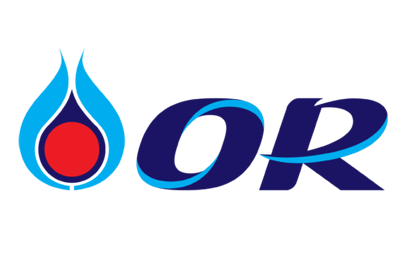
Importance
OR places great importance on product and service stewardship, recognizing it as a fundamental pillar of its business operations. As the company operates in both the oil and retail sectors, it offers products and services that directly engage with customers and consumers—particularly in the rapidly growing food and beverage business. OR therefore acknowledges the potential direct impacts in various dimensions, such as health, safety, and equitable access to essential products. Accordingly, OR is committed to maintaining the quality of its products and services in line with international standards, legal requirements, and regulatory frameworks issued by relevant authorities. The company has set clear targets for quality control and assurance to ensure that customers and consumers receive reliable, high-quality offerings. This aligns with OR’s dedication to creating satisfaction and trust in the company’s commitment to operational excellence.
Moreover, the 2024 Consumer Goods Industry Trend Report by Mastercard highlights the importance of product innovation in winning consumer loyalty. In the retail sector, key trends include a stronger emphasis on consumer sentiment and behavioral analytics, seamless spending experiences across digital and in-store platforms, the growing significance of retail media networks for brand engagement, and increased investments in digital transformation.
OR recognizes the opportunity to enhance its business competitiveness by delivering high-quality products and services tailored to consumer needs and expectations. This begins with efficient management and quality control throughout the product and service delivery process.
2024 Targets
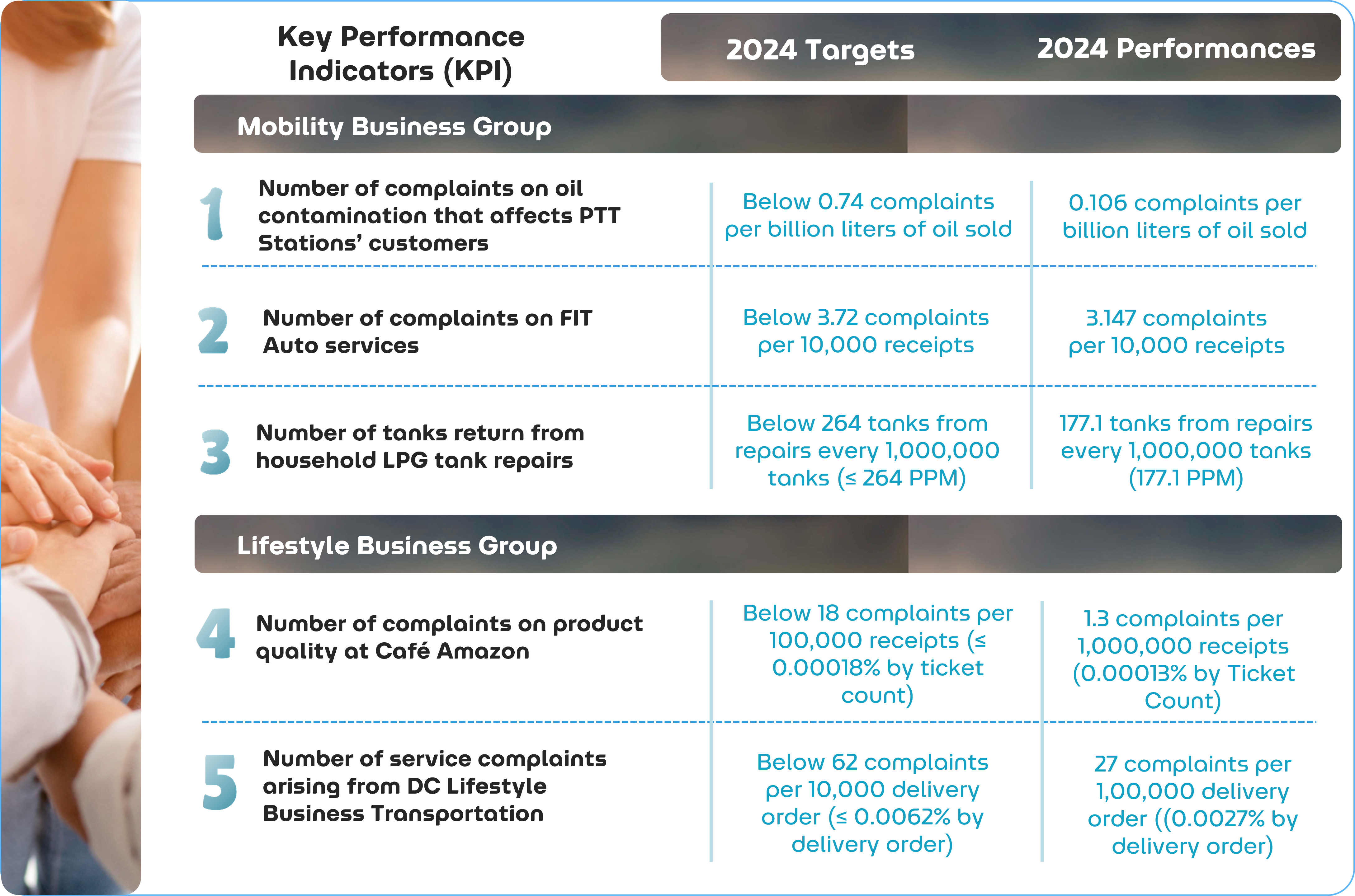
Management Approach
OR has adopted a systematic approach to quality management based on the ISO 9001:2015 standard and has implemented it across all business operations and enabler functions. The company has achieved ISO 9001:2015 certification for key own operation, including oil terminals, LPG terminals, petroleum terminals, aviation depot, lubricant products, and liquefied petroleum gas (LPG) cylinders, as well as related support processes—such as procurement, transportation, and distribution of oil and LPG products.
This achievement reflects OR’s firm commitment to maintaining high-quality products and services quality throughout its entire supply chain. The certification, awarded by an independent third party, affirms that the quality management systems meet internationally recognized standards. It also reinforces OR’s ongoing dedication to consistently delivering high-quality products and services, while building long-term trust with its customers.
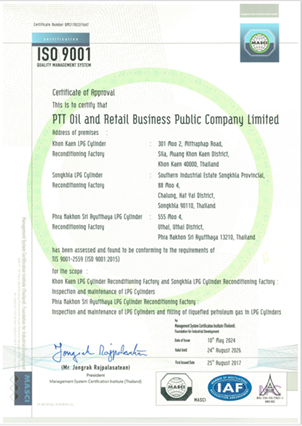
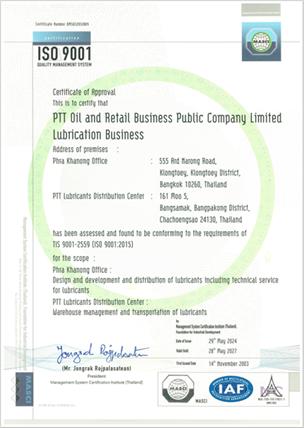
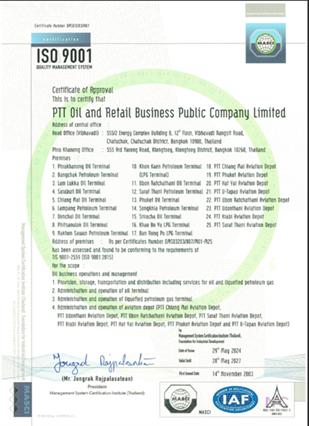
ISO9001:2015 certificate of OR’s key own operation
OR has established manuals and policies related to product and service stewardship to serve as practical guidelines. In addition, the company has developed Product Quality Plans and Process Control Plans to manage various risks that may affect the quality of products or services. Employees are provided with training in accordance with the requirements of the ISO 9001:2015 system.
For food-related products and services, OR has also obtained certification for the Food Safety Management System (FSSC 22000 and ISO 22000), in main production plants which incorporates the principles of HACCP (Hazard Analysis and Critical Control Points)—a system used to identify, control, and reduce potential food hazards.
Furthermore, OR conducts internal audits through appointed internal auditors and undergoes external audits by third-party organizations in accordance with ISO standards, to ensure that its products and services comply with the prescribed standards and relevant legal requirements, while also evaluating the effectiveness of the Quality Management System (QMS) for supporting continuous improvement.
This reflects OR’s commitment to ensuring high standards in product and service stewardship, which is proactively managed across all stages—design, production, and delivery—through rigorous quality controls, root cause analysis, and corrective and preventive actions aimed at minimizing defective products and preventing recalls.
Operating Framework and Related Policies
OR has established an operational framework and policies for product and service management to meet the needs of customers and stakeholders, aligning with the commitment to operate business sustainably. The operational framework and policies related to product and service management are as follows:
- Upholding Business Ethics in Business Activities Related to Customers and Consumers
With a dedicated commitment to ensuring high-quality products and services offered at fair prices, and securing utmost customer and consumer satisfaction, OR has established ethics and moral principles for conducting business in the Corporate Governance, Ethical Standards and Code of Business Ethics Handbook - Quality, Security, Safety, Health, and Environment Policy (QSHE Policy)
The 2024 Quality, Security, Safety, Occupational Health, and Environment Policy (QSHE Policy) reflects OR’s commitment to conduct business sustainably by focusing on and giving importance to both internal and external stakeholders through quality operations. It aims to control the processes of producing products and services to meet standards. Emphasizing safety and environmental friendliness throughout the value chain, OR aims to deliver high-quality products and services that align with customer requirements and comply with legal regulations, preventing product and service quality defects that could impact customers, reputation, and the Company’s image. In continuous pursuit of quality development at both group and individual levels, OR promotes creative thinking, knowledge sharing, and experience transfer through systematic Knowledge Management (KM) practices. This approach leads to increased productivity, innovation, and new business ventures, fostering sustainable growth. The QSHE policy is communicated throughout the OR group using the OR Group Way of Conduct Framework as a practice guideline or baseline for steering business operations in the same direction.
- OR Group Sustainability Management Guideline
OR has specified the group’s sustainability management guidelines according to the OR Group Way of Conduct with the objective of enabling OR Group operating areas, business units, and subsidiaries to systematically manage impacts or significant sustainability risks resulting from the organization’s decisions and operations on all stakeholders and to elevate social and environmental responsibility to strategic sustainable business operations. This is in order to deliver products and services to all stakeholders in a balanced and sustainable manner. The examples are caring for products and services, managing the supply chain, promoting innovation and technology for everyone, addressing consumer issues, engaging with communities, and community development.
Product and Service Stewardship Implementation
OR has developed product and service stewardship implementation plans for each business line to meet the different contexts, and included ‘Product and Service Standard: Quality/Safety/Environment’ as one of the corporate risks in the corporate risk profile, listed under business and operational risks, emphasizing the importance of product and service stewardship within its operations.The company conducts the training to employees who work in related to product and service stewardship in businesses. This includes training on ISO 9001:2015 requirements and each employee’s specific role in maintaining and upholding quality standards. OR has a system for tracking laws related to operations to deliver products and services (QSHE Legal Compliance). In addition, OR has audit system that involves both relevant internal and external audits, referred to as the ‘Internal Audit’ and ‘External Audit by Third Party’ respectively, to ensure that company’s products and services are aligned with prescribed standards and regulations, while also evaluating the effectiveness of the Quality Management System (QMS) and supporting continuous improvement.
Audit reports are sent to executives and related functions as monthly report and the product and service stewardship management is reviewed regularly, or in case of significant changes of the business. Performance reporting and monitoring of product and service stewardship is reported on a quarterly basis (Key Risk Indicator: KRI) at the OR QSHE GMC meeting, and depending on the different product and service. The performance data as reported will be used in analysis for improving process and operation continuously.

Mobility Business Group:
PTT Station
With the intention of making PTT Station a space that truly enhances everyone’s well-being and a leader in the energy sector, in 2024, PTT Station’s direction and business strategy focused on the framework of quality and service, aiming to promote a good living environment, collaborating with stakeholders and the community in 4 key aspects:
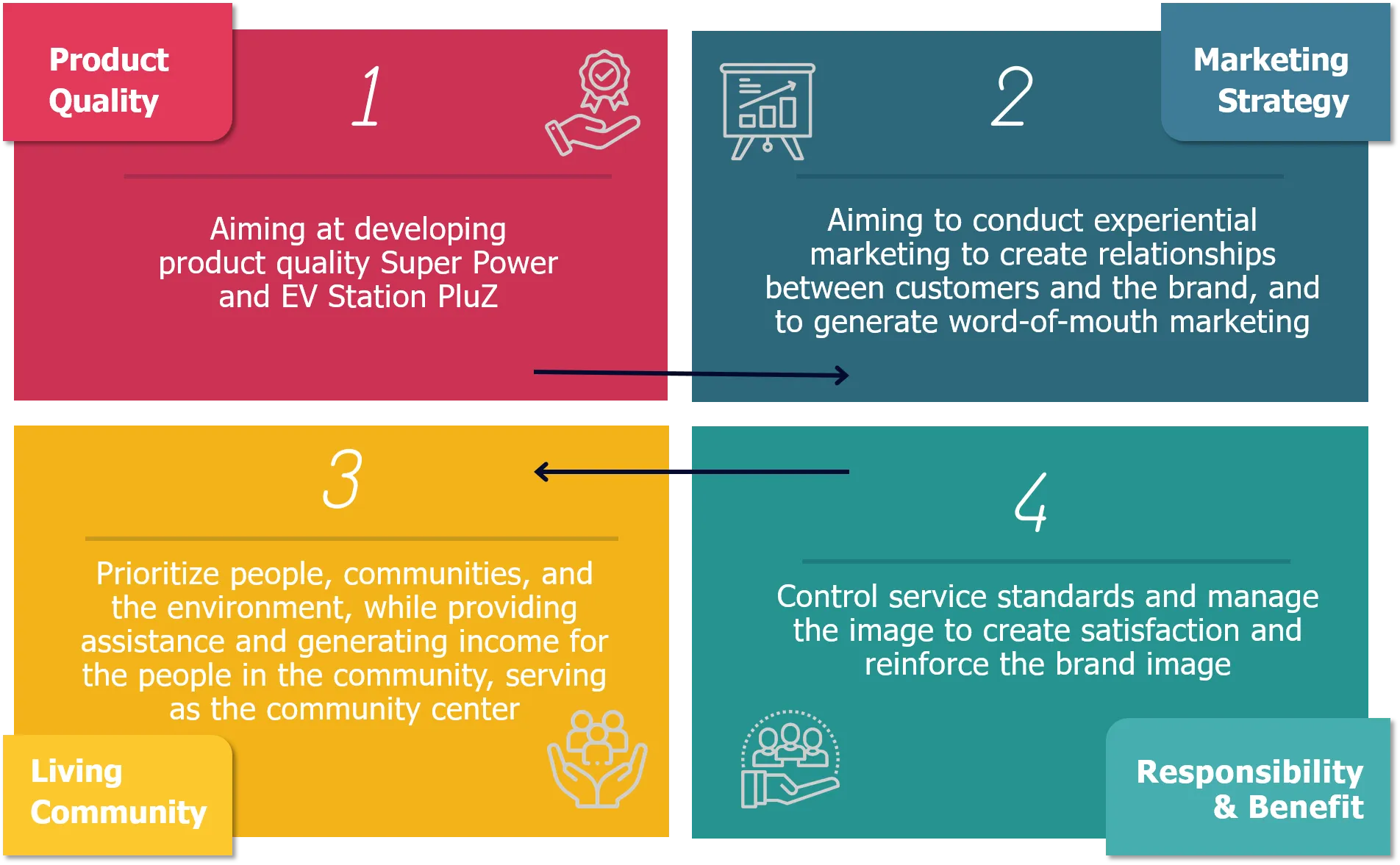
PTT Station places emphasis on the convenience and safety of all consumers, adhering to legal standards and relevant regulations through various components within PTT Station, whether it’s designing service stations with a Friendly Design for convenience and safety, catering to diverse customer groups, accommodating all genders, ages, and body types equally, and providing assistance points for travelers with basic roadside assistance equipment. Additionally, there are first aid equipment and assistance points available at PTT Stations to ensure the well-being of both vehicles and people throughout their journey.
In addition, there is a training program for employees at PTT Station to respond to emergencies, and the establishment of Service Station Standards to communicate the safety management standards of PTT Station with distributors and those responsible for managing PTT Stations that are Company owned and operated. This ensures that they can provide services according to the specified standards and follow operational guidelines in the event of emergencies, as well as adhere to communication protocols, ensuring that PTT Station complies with the highest safety standards, serving all customers and communities and ensuring that individuals of all ages and body types can access and safely and conveniently use the services.
Details of safety management in PTT Station: Occupational Health and Safety topic Click
Quality assessment of PTT Station standards nationwide
OR has applied Quality Management System (QMS) to audit PTT Station on a regular basis. IT Technology is developed to record various audit information accurately and quickly through the mobile application. The audit report is sent to PTT Station management monthly. The assessment contains four parts as follows:

Auditors visit the PTT Stations to assess each PTT Station based on the audit criteria according to the PTT Station Standard Assessment Manual. There are 2 assessment teams as follows:
- The Mobile Audit team is the PTT Station audit team who performs the monthly audit. If there is any issues or incidents that need improvement, the Mobile Audit team will communicate the issue, details, along with photos attached, so that the PTT Station can take further corrective actions and make improvements.
- The Mystery Shopper team is a third-party auditor that assesses PTT Stations anonymously. This evaluation includes PTT Stations operated by OR and those operated by independent dealers, as well as owned by PTT Retail Management Company Limited (PTTRM).
In 2024, there were a total of 32,063 audits conducted for PTT Stations. This comprised 26,007 audits by the Mobile Audit team and 6,056 audits by the Mystery Shopper team. The audits covered all 2,149 stations (100% of all stations) and 151 PTTRM sites (100% of all PTTRM). These assessments were carried out through either Mobile Audit and/or Mystery Shopper at least once during the past year.
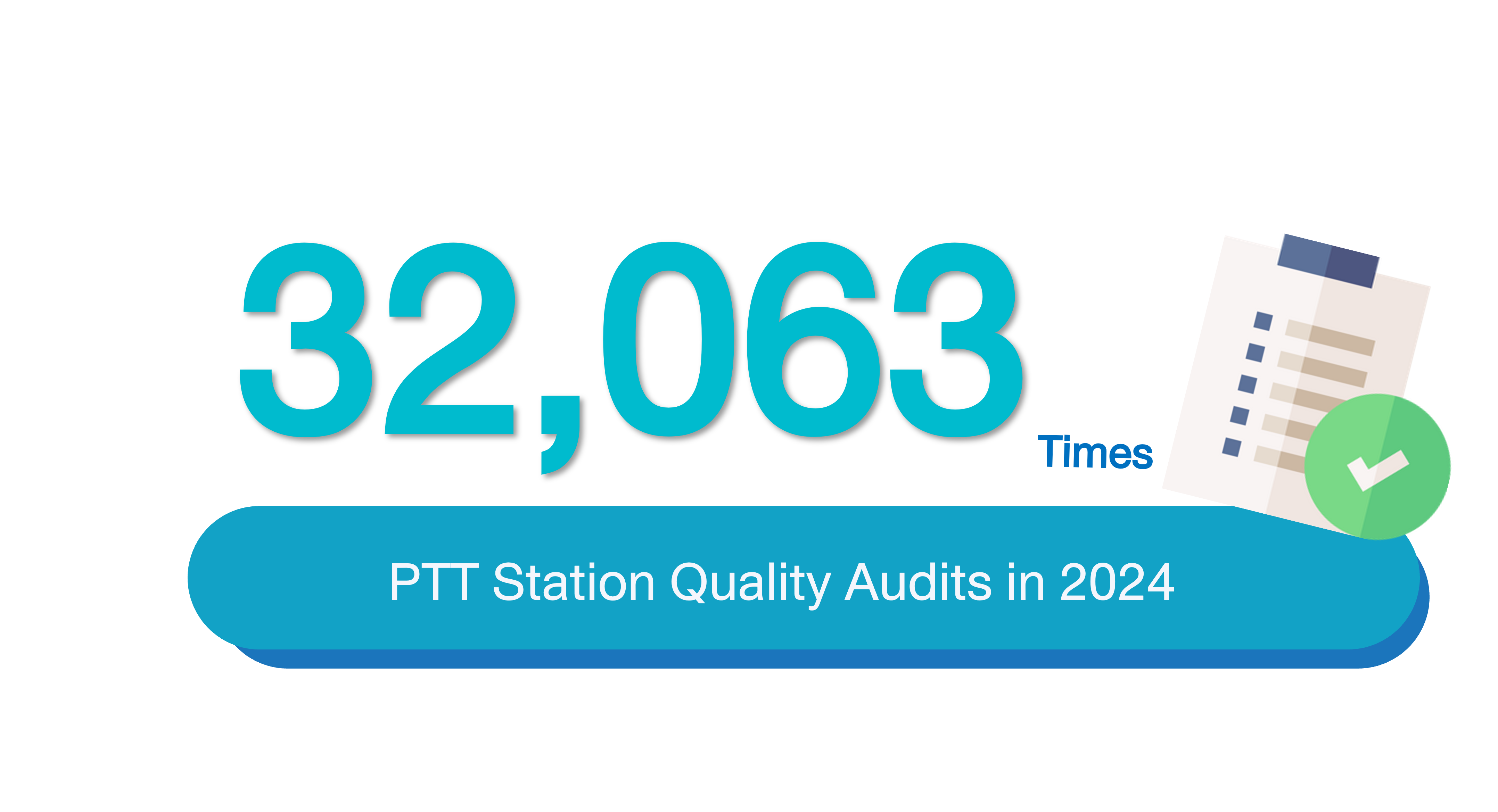
Fuel Product and Lubricants Quality Control Process
OR manages, controls, and oversees the storage, receipt, and distribution of reserve petroleum products, liquid petroleum gas (LPG), and other refined products at storage facilities nationwide, as well as the operation of storage, receipt, distribution, and the packaging of products for transfer between storage facilities and delivery to customers via various modes of transportation, including automobiles, trains, and maritime vessels.
Currently, OR manages and controls the storage, receipt, and distribution of reserve petroleum products, liquid petroleum gas (LPG), and other products across the country. This is done to meet the needs and provide benefits to the public in all areas, reduce transportation costs as a part of the fuel price, and assist the public in accessing quality fuel at fair prices. There is a Quality Analysis and Product Research & Development Department supporting the operational unit responsible for petroleum warehouse operations. The unit’s main mission is to provide support to the operational unit in controlling the quality of products. It also functions as a laboratory for analyzing and testing leading petroleum products using modern tools and equipment in accordance with international standards. The unit is involved in analyzing and controlling the quality of various petroleum products, including LPG, ground fuel, aviation fuel, industrial fuel, marine fuel, and special products. Furthermore, it supports the lubricant business in conducting hand-blend experiments to develop and research lubricant oil formulations, as well as performs quality control for all lubricant products sold under the PTT Lubricants brand, covering all processes from procurement, to receipt, storage, distribution, as well as distribution to consumers in accordance with the Quality Control Plan and ISO 9001 systems to ensure high-quality products in compliance with legal requirements and customer agreements. The Quality Analysis and Product Research & Development Department has also been certified for the competence of its testing laboratory and calibration laboratory according to ISO/IEC 17025, an international standard recognized worldwide.
In addition, the Quality Analysis and Product Research & Development Department also operates a fleet of 6 Mobile Laboratories. These laboratories are responsible for planning quality inspections of the fuels sold at PTT Station stations. The inspections are Random Checks, performed at least once a year. In 2024, quality inspections of fuel at PTT Stations were carried out according to the plan, covering a total of 2,214 stations, representing 100% of the stations.
PTT LPG Business
Building on the success in the LPG market, PTT formulated a business strategy for LPG in 2024 under the concept ‘LPG for All,’ incorporating the 5Cs:Customer: Engaging in business collaborations with dealers, Consumer: Accessing consumers directly, Community: Enhancing the quality of life for communities and society, Country: Creating a society focused on safety and sustainability, Collaboration: Conducting business through collaboration among all parties to foster business growth, while taking care of stakeholders from all aspects
To ensure that OR’s customers are safe while using the product, OR focuses on providing product knowledge training to suppliers and customers. and performing emergency drill plans for the customers at the LPG filling plant and LPG service stations regularly, as well as increasing the safety standards of cooking gas cylinders, which are made of steel that is thicker than the required standard in order to ensure the cylinders withstands pressure very well. The material has been certified by the Thai Industrial Standards Institute (TISI). Every cylinder must pass the standard 6 step quality control and safety measures before being delivered to consumers as follows:
- Inspect the condition of the cylinder to determine whether it meets the safety standards. There must be a TIS mark stamped on the cooking gas cylinder. If a cooking gas cylinder is found to not meet the standards, it will be sorted for maintenance or destruction.
- Clean the cylinders that have already passed the standard LPG cylinder condition inspection.
- While filling the gas cylinder, the gas weight must be controlled according to the standard of size of the cylinder.
- In the weighing process, if the weight is lacking or exceeds the specified standard, the cylinder is taken back to the filling station to be refilled and re-weighed. This ensures that every cylinder meets the LPG content standard.
- Inspect the cylinder for leaks by testing the flue gas cylinder, valves, and valve threads. If a leak is found, the cylinder will be sorted out immediately.
- Inspect the valves and gold seals. The inspection of the tightness of the seals is the final step before delivering the cylinder to the shop for further delivery to the consumer.
Cooking gas cylinders that have reached the age of 5 years from the month/year of the last test will be put to the hydrostatic test process to re-test for leaks. Cylinders that have reached the age of 10 years will be put to the expansion test process to determine the expansion rate of the gas cylinder at the specified pressure according to the industrial product standard regarding the use and maintenance of liquefied petroleum gas cylinders (TIS 151). The valves of the cylinder must also undergo a safety testing process. Valves that are less than 10 years old will be tested for leakage and safety relief. Valves that are damaged or older than 10 years will be destroyed to ensure that consumers use the safest cooking gas cylinders.
OR has integrated the safety innovation “Check Lock Valve System” according to TIS 915-2562 standard regarding valves for liquefied petroleum gas cylinders, with a tongue design for the fuel gas cylinder to prevent gas leakage and fires during transportation and consumer use.
Lubricants Business
PTT Lubricants and FIT Auto
The safe operation of OR’s lubricant business covers raw material procurement, production, packaging, warehousing, and product transportation, loss prevention from emergencies, crisis, potential occupational injuries and illnesses to employees and stakeholders, as well as improving the working environment to promote good quality of life for workers. OR focuses on health and safety throughout the supply chain through analysis and a development plan to reduce potential risks. The details are as follows.
- Preparation of operation manuals for FIT Auto automotive service in accordance with the Service Standard and the Operation Standard, both in the form of a booklet and an online format so that employees can study conveniently and offer training to FIT Auto automotive service technicians both theory and practice sessions, in order to operate and service customers according to the safety standard.
- Conducting training on service standards, such as management, sales techniques, and service operations, following the standards set by the Automotive Service Center (for authorized dealers), as well as exceeding customer expectations, sales system processes, and product knowledge in the automotive sector.
- Installation of fire extinguishers at specified points, along with various warning signs to increase safety for customers of the FIT Auto automotive service.
- Quality control of vehicle inspection services at FIT Auto automotive service to ensure the safety of the vehicles brought in for service prior delivering to customers. The inspection is conducted by competent staff who is trained to operate according to operational standards. OR communicates safety information through using the Occupational Health and Safety Management and Safety Data Sheet according to GHS (Globally Harmonized Systems of Classification and Labelling of Chemicals) for all lubricants.
- Feature a chemical hazard symbol (Diamond Sign) on the packaging. For products sold to industrial customers, all products are labelled with hazard warnings and precautions, based on the Global Harmonized System (GHS), a system for generating Safety Data Sheets (SDS). In addition, Safety Data Sheets (SDS) for all products are published on the PTT Lubricants website.
- Use the Automated Storage and Retrieval System (AS/RS) for receive-collect-distribute at Lubricant Distribution Center. The system helps to collect and distribute the lubricant products effectively, fast and accurately, and reduce employee accident and product quality and quantity delivery defect incidents.
PTT Lubricants is committed to continuous product development with excellent quality to instill confidence in customers when making purchases, through a quality control process in collaboration with partners through the Quality Management System (QMS) available on the website. The company also has a team of experts to provide knowledge about lubricant products to distributors and customers. Additionally, PTT Lubricants actively seeks feedback from customers and consumers through seminars and meetings with lubricant distributors, regularly meeting and visiting distributor groups through various channels, including exploring the commitment from PTT Lubricants’ customers and consumers, as well as FIT Auto. This is done to analyze suggestions and complaints, take corrective actions, and continually improve products and services.
Lifestyle Business:
Café Amazon
Consumer behavior shifts to focus on healthy foods and beverages alongside with producing the foods and beverages to meet food safety standard. Café Amazon shop prescribes the strategies to maintain the safety standard for foods and beverages that aligned with Consumer Protection Board. At the same time, Café Amazon also invents and develops the products and services which related to health and safety of customers continuously. The business also communicates those standards to other Café Amazon shops both in nationwide and across the countries. This is included the compliance monitoring followed regulations and rules strictly.
In addition, the group of manufacturing factories producing products related to Café Amazon, with OR as the operator, has received international certification in food safety management systems, including GHP, Halal, and HACCP. The coffee roasting and powder mixing facilities within the Café Amazon business have been certified under the FSSC 22000 standard, which is an internationally recognized food production safety standard. This certification demonstrates OR’s commitment to continuously improving our manufacturing processes to secure consumer confidence in our product safety and quality.
In the aspect of emphasizing quality in the product manufacturing process, the mixed powder production factory has adhered to the continuous improvement standards (ISO 18404: Quantitative methods in process improvement — Six Sigma). This practice is employed to control the manufacturing and packaging processes, enabling the mixed powder production facility to efficiently manage costs by minimizing losses in process control.
Café Amazon shop places an emphasis on providing information about the nutritional value and safety of its products. Therefore, Café Amazon complies with product labeling standards in accordance with the requirements in “Announcement of the Food and Drug Administration Re: Clarifications to the Announcement of the Ministry of Public Health Re: Labeling of Food in Containers (No. 3) and (No. 4)”, the goods and products of instant foods and beverages group shall show the label in accordance with the announcement.
Inspection of quality standards and safety at Café Amazon
Café Amazon is invested in improving the quality and standards of store audits through the use of mobile applications, which utilizes the QMS System. In addition, since 2021, OR has operated the Audit Care+ as a communication channel that also takes questions and provides information on quality and service standards in stores. OR utilizes four different types of audits to inspect Café Amazon, including:
- Standard Audit (Quality Services Cleanliness; QSC) are conducted by the OR Audit and Quality Control Team and cover the operation and service of stores located inside PTT Stations and outside PTT Station (stand-alone branches). The audits are conducted on a monthly basis and cover all branches across the country. Assessment criteria focus on store compliance with OR standards and requirements, including three criteria:
Part 1: Quality of beverage and other products
Part 2: Employees and service quality
Part 3: Cleanliness and store maintenance
- Mystery Audit are conducted by the OR Audit and Quality Control Team, and are random, anonymous audits of targeted stores. The mystery audit focuses on inspecting the service standards and the quality of the branch’s products to ensure consistency, to supervise franchisees in the development of service and quality standards, as well as to resolve complaints in a timely and efficient manner based on information received from various channels, such as the Standard Audit, Mystery Shopper, and complaints from the Ordering & Customer Relations Center 1365.
- Operation Audit are audits of branches that are owned and operated PTT and OR (Company Own, Company Operate: COCO). These audits cover finances, cash, stock and inventory, loss control, and various control policies as specified by OR. Branches that are privately owned and managed, or franchises, will be audited and advised regarding further development.
- Mystery Shopper are audits conducted by third-party auditors. OR employs external companies to inspect and evaluate the branches at least 3 times per year. Currently, the Café Amazon business currently uses Mystery Shopper points as part of its annual best branch evaluation program and the annual service excellence contest. This is combined with the Standard Audit score. The score affects the consideration of branch expansion and renewal of the franchise agreement.
In addition, OR also tracks and addresses issues through on-the-job training and supervision to ensure compliance with franchise agreements, as well as handles Voice of Customer through the Customer Relations Contact Center 1365. This ensures confidence that all branches can operate according to the standards set by OR, providing customers with quality products and services.
Throughout 2024, Café Amazon audits were completed and included: Standard Audits (Quality, Service, Cleanliness: QSC) for all 4,418 branches (1 audit/branch/month); Operation Audits (Store Audits) for branches managed by OR, averaging more than 3-4 audits/branch/year; and Mystery Audits (3rd party) for all branches, except for branches in the three southern border provinces, at a rate of three audits/branch/year. The average score of the Standard Audit (Quality, Service, Cleanliness: QSC) for Café Amazon was 96.24 points. This is broken down as 95.82 points for branches located in PTT Stations and 96.55 points for branches located outside PTT Stations.
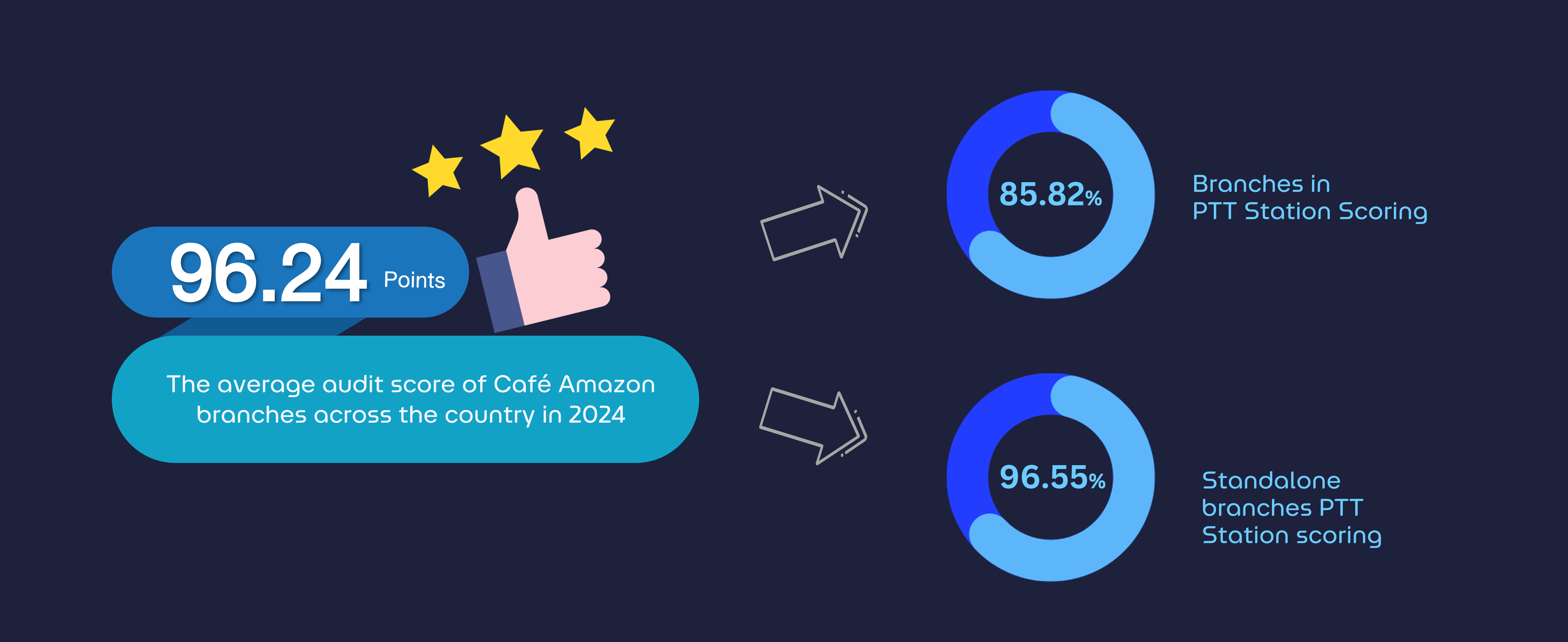
Traceability
OR places great importance in ensuring product safety through the value chain. Our product traceability system allows us to make certain that all product-related activities, from raw material sourcing to production and distribution, comply with relevant standards and safeguard the health and safety of our consumers. If a product is found to be non-compliant to quality standards, whether due to faults at the raw material sourcing stage or distribution, OR will conduct a preliminary inspection at the point of fault and take corrective action immediately. If the faulty product is a main product that affects the distribution to consumers and is likely to have wide-ranging impacts, OR will coordinate with the manufacturer to consider a recall of the whole faulty lot and take corrective actions to complete needed improvements.
PTT Station business has quality controls integrated in all oil loading, storage, processing, and distribution processes in petroleum terminals, in accordance with our Quality Control Plan (QC Plan), which is comprehensive of activities across oil refineries, petroleum terminals, and PTT Stations. OR has established oil quality inspection plans for every PTT Station, prescribing that each station is inspected once per year. In addition, OR provides technical services to PTT Station customers who have encountered issues with oil quality at the station, or for end-user customers who have submitted complaints on oil quality at the station via the area manager (AM) or the OR Contact Center 1365 Channel. (The system records the information and monitors progress of resolving the complaint.)
OR operates LPG Cylinder Refurbishing Plants to test and maintain gas cylinder in alignment with the Thai Industrial Standards (TIS 151) and have a system to record the results of testing and maintenance of LPG cylinders.
For the Lubricants business, quality control and inspection procedures start from processes to load raw materials and extend towards lubricant product distribution and delivery. OR attaches the batch number to each lubricant batch to allow for tracking and traceability. In case that users have questions or encounter issues when they are using the product, they can notify OR for further investigation. OR will then assign relevant departments to inspect and resolve the issue.
The Café Amazon business has applied quality management system practices by focusing on product quality control from the acquisition of raw materials to the delivery of products to customers. For the selection process of suppliers who deliver raw materials, such as coffee beans, drink powder, and milk, OR has an assessment of the production site and product quality. Supplier production processes must be certified according to the defined standards for each product group, including the ability to produce and deliver products to maintain quality in accordance with the requirements in the Terms of Reference (TOR).
Product Recall Process
OR has defined procedures for product recall for each business group to ensure that we take responsibility for controlling product quality standards relating to health and safety. OR has clearly defined relevant procedures and approval authorities for the recall process to prevent non-compliant products from reaching end consumers.

In addition, OR has established complaint channels where consumers can provide feedback and suggestions on OR’s products and services, including reports of defective issues or products through the Contact Center 1365 and online social media platforms. Once OR receives feedback and suggestions from consumers, an inspection is promptly conducted, corrections are made, and the resolution and preventive measures are communicated immediately. This is done to genuinely address and respond to complaints, fostering confidence in consumers or complainants to trust in OR’s products and services moving forward.
Performance
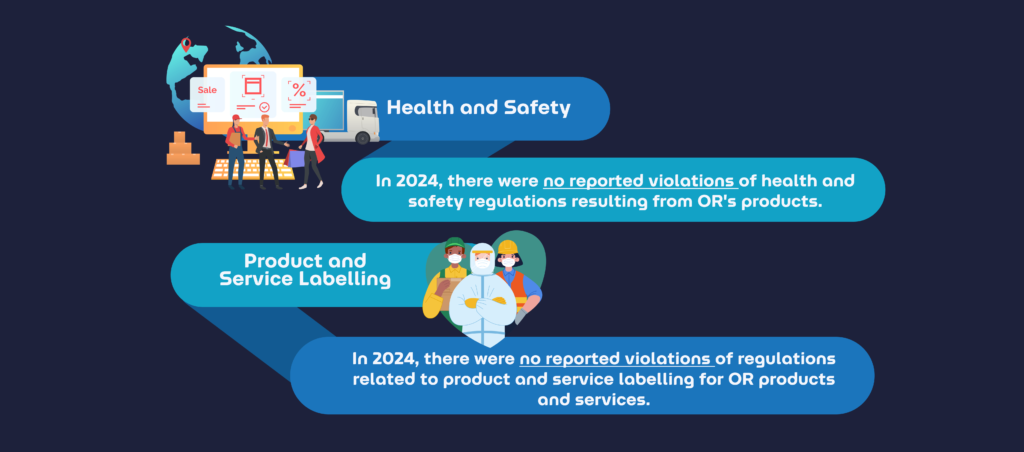
2021 | 2022 | 2023 | 2024 | |
Number of recalled issued | 0 | 0 | 0 | 0 |
Total units recalled | 0 | 0 | 0 | 0 |
Improving the Quality of Products and Services
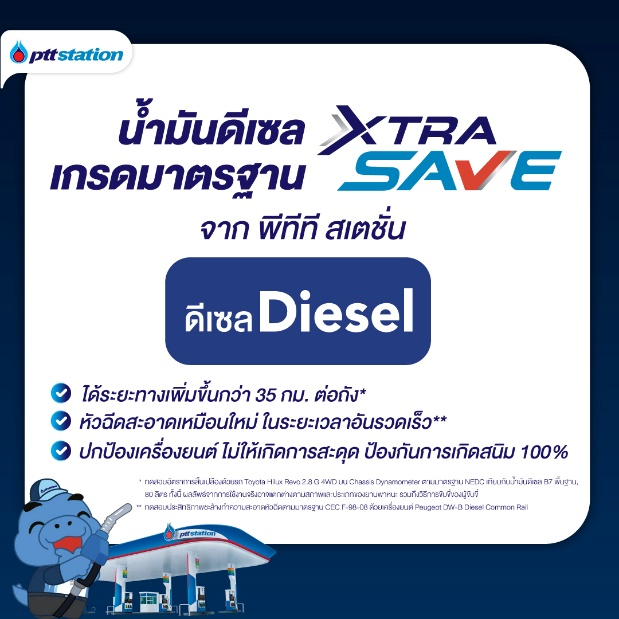
PTT Station distributes both gasoline and diesel with Euro 5 standard quality with sulfur content less than 10 PPM, helping to reduce exhaust emissions and small dust particles, starting from 1 January 2024. In addition, diesel has been adjusted twice in accordance with the announcement of the Department of Energy Business. The first time was on 1 May 2024, with a policy to reduce the type of diesel to 2 grades: regular diesel (B7) and B20 diesel. Diesel distributed at PTT stations has been renamed from Xtra Save Diesel B7 and Super Power Diesel B7 to Xtra Save Diesel and Super Power Diesel, respectively, with the same 7% biodiesel blend. Later, according to the resolution of the Energy Policy Administration Committee, the B100 blending proportion in regular diesel has been reduced from B7 to B5, effective from 21 November 2024, while still using the same name as diesel distributed at PTT stations.

Café Amazon organized the 2024 Café Amazon Barista Championship to raise the standards of service and beverage quality. It is also a stage for baristas to show their skills and develop the skills necessary for modern baristas, including knowledge about coffee, use of equipment, creating new menus, and brewing coffee correctly according to Café Amazon standards, with over 400 baristas from all over the country and branches abroad participating in this competition.
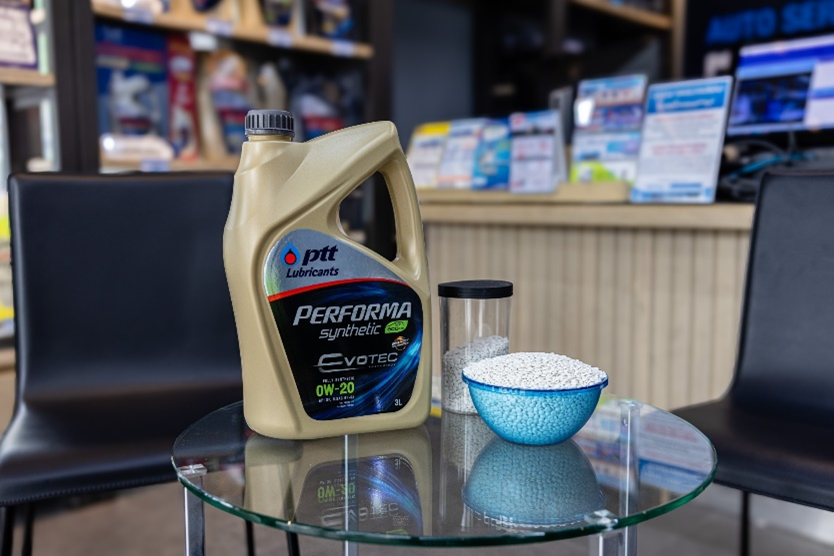
PTT Lubricants uses Post-Consumer Recycled (PCR) plastic as a component in the production of Performa Synthetic Eco Car lubricant gallons. PCR is a plastic commonly used by consumers, such as plastic bottles, plastic packaging, and plastic bags. These plastics are sorted, cleaned, and ground into small plastic pellets, which are then molded into new products. Therefore, the lubricant gallons have an increased proportion of PCR to replace virgin plastic by 30%, reflecting the importance of sustainability and environmentally conscious business operations in line with OR’s sustainability policy.
In 2024, PTT Lubricants has continued to develop products and launched a new formula of lubricants, “EVOTEC Technology”, focusing on reducing air pollution and PM 2.5 dust problems that affect public health. With the outstanding features of EVOTEC’s 3Es that take into account all dimensions for the future, including Environment: reducing pollution and carbon dioxide emissions, promoting a good and clean environment for a sustainable future, Endurance: cleaning dirt and protecting the engine for maximum durability in all driving conditions, whether heavy use or long periods of time, and Efficiency: increasing driving performance to full power at all accelerations, helping to save fuel to the maximum.
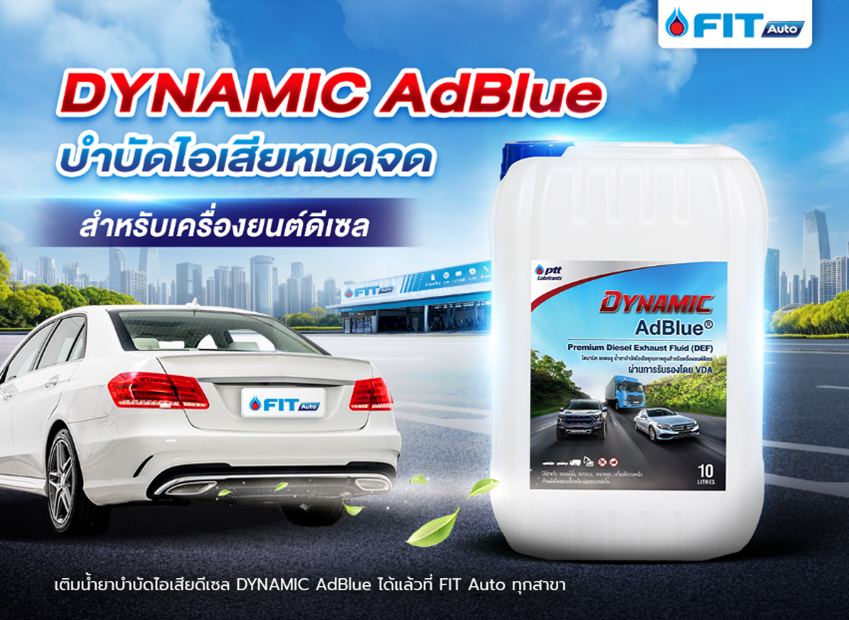
FIT Auto service center provides diesel exhaust treatment fluid DYNAMIC AdBlue, a high-quality diesel exhaust treatment fluid designed specifically for modern clean diesel engines with Euro 5 and 6 technologies equipped with Selective Catalytic Reduction (SCR) in the exhaust treatment system. It is produced from high-purity urea solution using an advanced process to control the number of contaminants to the lowest level and meets international standards. DYNAMIC AdBlue is highly effective in reducing the emission of nitrogen oxides (NOx), which are pollutants, and helps extend the life of the catalyst. In addition, with the precise proportion of chemical components, it also helps prevent the problem of excess ammonia gas, which causes a pungent smell at the end of the exhaust pipe (Ammonia Slip).
Health and Beauty products OR foresees an opportunity in developing health and beauty products, which are currently continuously expanding in the market. In 2024, OR established OR Health & Wellness (ORHW) and officially launched the first 5 branches of Found & Found, a health and beauty retail store, with the concept of “SIMPLE. EASY. EVERYSKIN.” with a plan to open 10 branches by 2025. Products distributed in the stores cover cosmetics, skincare, supplements, and vitamins. ORHW collaborated with leading partners to introduce new innovative products, including SUGI Holdings, one of the leaders in drugstore chains and the largest nanotechnology platform from Japan, importing quality brands that are exclusives at Found & Found, such as Prieclat U, S-Select, Method, and T3. In addition, Konvy, the No. 1 beauty e-commerce leader in Thailand, is an important partner in managing products in the supply chain system and presenting quality products from well-known brands.
PTT LPG emphasizes its high-quality products that meet consumer needs with 3 key features: “Safe, Fast Heating, Strong Flame” with an easily recognizable safety standard guarantee symbol, the “QR gold seal” with a 10-digit code, to assure consumers that they have received PTT LPG whose containers have been tested and maintained according to TIS standards and have been filled with quality gas from OR.
Site map
- About
- Organization
- Career
- Oil Business
- - Retail Energy Solution
- - Commercial Business
- Retail Business
- Services
- International Business
- Business Opportunity
- Sustainability
PTT Oil and Retail Business Public Company Limited
555/2 Energy Complex Building B, 12th Floor, Vibhavadi Rangsit Rd., Chatuchak, Bangkok 10900
© 2024 OR Tel : 02 196 5959
